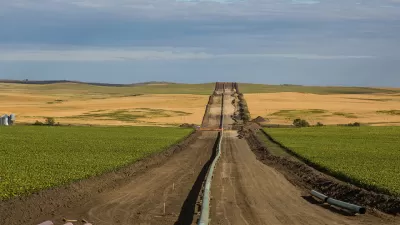With many oil pipelines stalled due to popular opposition and/or regulatory hurdles (e.g. Keystone XL and Northern Gateway, or even refineries opting for more flexibility) there seemed to be no end to the growth in moving oil by rail...until now.
Alison Sider writes that companies hoping to build rail terminals in Washington state capable of receiving the vast oil trains, also referred to as crude by rail or CBR, originating from the booming oil fields in the Bakken formation of North Dakota, are also encountering opposition.
The terminals are necessary to ship or barge the oil to refineries in Washington, Oregon, California and elsewhere, "(b)ut getting a permit in Washington is proving more challenging than companies expected." The "Lac Mégantic" effect is playing a role.
"The whole enterprise raises serious concerns about the heightened risk of transporting crude by rail," said Devorah Ancel, a staff attorney for the Sierra Club, an environmental advocacy group that has opposed some of the crude-by-rail projects at Washington ports.
There are economic advantages to building rail terminals in Washington state for receiving oil from North Dakota, now the second largest oil-producing state after Texas, producing over 1 million barrels a day (which includes neighboring states that compose the Williston Basin). It costs refiners only $10 barrel, "compared with $13 to $16 for a barrel of crude to travel by rail to California and $16 to ship a barrel to the East Coast," writes Sider.
But projects planned for some of the state's ports, where oil would be unloaded from trains, stored in tanks, and transferred to barges, have attracted criticism. A state hearing board recently overruled the City of Hoquiam, southwest of Seattle, which had issued permits to expand two terminals at the Port of Grays Harbor, west of Tacoma, to handle crude.
Pipeline projects that encountered opposition, in addition to Keystone XL, include the Northern Gateway in British Columbia, and the Freedom Pipeline from West Texas to California, which was dropped after California refineries opted to receive crude-by-rail.
However, the news is not all bad in the oil pipeline business. Keystone XL's southern leg, from Cushing, Okla., to the Gulf Coast at Port Arthur, Tex. will be operational on Jan. 3, reported the Huffington Post on Dec. 3.
FULL STORY: Moving Crude by Railcar Stalls on the Track

Alabama: Trump Terminates Settlements for Black Communities Harmed By Raw Sewage
Trump deemed the landmark civil rights agreement “illegal DEI and environmental justice policy.”

Study: Maui’s Plan to Convert Vacation Rentals to Long-Term Housing Could Cause Nearly $1 Billion Economic Loss
The plan would reduce visitor accommodation by 25% resulting in 1,900 jobs lost.

Planetizen Federal Action Tracker
A weekly monitor of how Trump’s orders and actions are impacting planners and planning in America.

Waymo Gets Permission to Map SF’s Market Street
If allowed to operate on the traffic-restricted street, Waymo’s autonomous taxis would have a leg up over ride-hailing competitors — and counter the city’s efforts to grow bike and pedestrian on the thoroughfare.

Parklet Symposium Highlights the Success of Shared Spaces
Parklets got a boost during the Covid-19 pandemic, when the concept was translated to outdoor dining programs that offered restaurants a lifeline during the shutdown.

Federal Homelessness Agency Places Entire Staff on Leave
The U.S. Interagency Council on Homelessness is the only federal agency dedicated to preventing and ending homelessness.
Urban Design for Planners 1: Software Tools
This six-course series explores essential urban design concepts using open source software and equips planners with the tools they need to participate fully in the urban design process.
Planning for Universal Design
Learn the tools for implementing Universal Design in planning regulations.
Caltrans
Smith Gee Studio
Institute for Housing and Urban Development Studies (IHS)
City of Grandview
Harvard GSD Executive Education
Toledo-Lucas County Plan Commissions
Salt Lake City
NYU Wagner Graduate School of Public Service



























